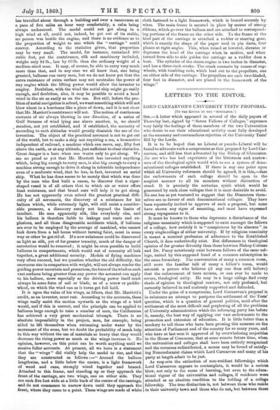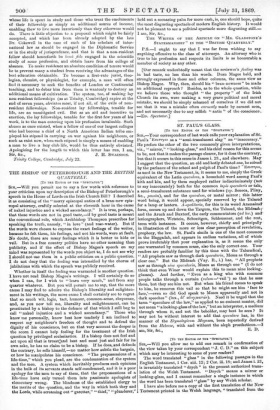LETTERS TO THE EDITOR.
LORD CARNARVON'S UNIVERSITY TESTS' PROPOSAL [TO ras EDITOR OF THE .‘ SrEcuroa.1 Sist,—A. letter which appeared in several of the daily papers of Thursday last, signed by " Seven Fellows of Colleges," expresses very fairly the feelings of those members of the two Universities who desire to see their educational activity most fully developed at the summary and contumelious rejection of the University Testa' Bill by the Lords.
It is to be hoped that no Liberal or pseudo-Liberal will be •
found to advocate such a compromise as that proposed by Lord Car- narvon, and still less that advocated by the Bishop of Gloucester. No one who has had experience of the bitterness and narrow- ness of the theological spirit would wish to see a system of deno- minational colleges established. If there is any one point upon which all University reformers should be agreed, it is this,--that the endowments of each college should be open in the amplest manner to all its members without distinction of creed. It is precisely the sectarian spirit which would be generated by such close colleges that it is most desirable to avoid. No one has as yet ventured to suggest that the Dissenters them- selves are in favour of such denominational colleges. They have been repeatedly invited to approve of such a proposal, but none have shown any signs of assenting, and most have expressed strong repugnance to it.
It must be known to those who deprecate a disturbance of the religious unanimity which is supposed to exist amongst the fellows of a college, how entirely it is "conspicuous by its absence " .in every single college of either university. If by religious unanimity is meant a nominal profession of adherence to the Established Church, it does undoubtedly exist. But differences in theological opinion of far greater diversity than those between Bishop Colenso and Dr. Pusey notoriously exist between fellows of the same col- lege, united by this supposed bond of a common subscription to, the same formulary. The conversation of many a common room, still more the familiar talk of many a fellow's room, would astonish a person who believes (if any one does still believe) that the enforcement of tests secures, or can ever be made to secure, theological unity. He may in a large college find every shade of opinion in theological matters, not only professed, but earnestly believed in and zealously supported and defended.
Under the guise of a compromise, Lord Carnarvon's proposal is
in substance an attempt to postpone the settlement of the Tests' question, which is a question of general politics, until after the settlement of the most difficult and perplexing of all the problems of University administration which the reforming party has before it, namely, the best way of applying our vast endowments to the promotion and extension of education. It is little better than a mockery to tell those who have been pressing this measure on the attention of Parliament and of the country for so many years, and who have at last seen it approved of by overwhelming majorities in the House of Commons, that at some remote future time, when
the universities and colleges shall have been entirely reorganized and the revenues redistributed, a means may be found of satisfy- ing Nonconformist claims which Lord Carnarvon and many of his party at length admit to be just.
As resp ects the extinction of non-resident fellowships which Lord Carnarvon appears to contemplate, it would be a serious blow, not only to the cause of learning, but even to the educa- tional vigour of the universities and colleges, if residence were attached as an absolute condition to the holding of a college fellowship. The true distinction is, not between those who reside in their university town and those who do not, but between those whose life is spent in study and those who treat the emoluments of their fellowship as simply an additional source of income, enabling thew to live more luxuriously than they otherwise would do. There is little objection to a proposal which might be fairly accepted, and which has been already adopted by the late Dr. Cokewell in the case of such of his scholars of inter- national law as should be engaged in the Diplomatic Service or in the study of jurisprudence, and that is that a non-resident fellow should henceforth be bond fide engaged in the scientific study of some profession, and obtain leave from his college of absence. To make residence an absolute condition of tenure would be to prevent many a student from receiving the advantages of the best education obtainable. To become a first-rate jurist, theo- logian, chemist, or physiologist, for example, a man will often find it necessary to seek the benefits of London or Continental teaching, and to debar him from them is wantonly to destroy an additional means of cultivation. The system, too, of making lay non-resident fellowships (as at Trinity, Cambridge) expire at the end of seven years, obviates most, if not all, of the evils of non- resident fellowships. Non-resident lay fellowships, tenable for life, are an unmitigated evil. But as an aid and incentive to exertion, the lay fellowships, tenable for the first few years of his work, is to the man entering upon his profession invaluable. Such abuses as once existed, when a fellow of one of our largest colleges who had become a chief of a North American Indian tribe em- ployed his stipend in carrying on war against his neighbours, or such as exist now, when such stipend is simply a means of enabling a man to live a lazy club life, would be thus entirely obviated. Apologizing for the length to which this letter has run, I am, Sir, &c., J. H. SWAINSON. Trinity College, Cambridge, July 22.































 Previous page
Previous page